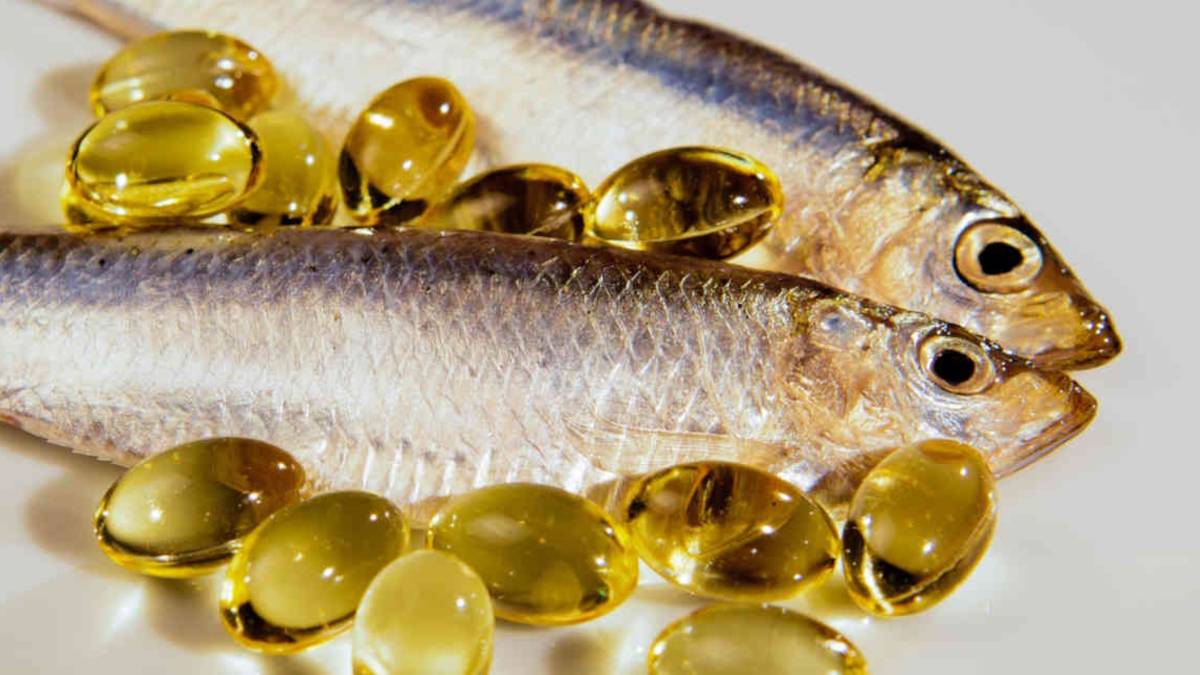Omega 3 fatty acids play a vital role in keeping your heart, brain and eyes healthy. Dr Hilary Jones explains.
🕒 6 min read
What are omega 3s?
Omega 3 fatty acids are a group of polyunsaturated fats that are vital for wellbeing and come in a variety of different forms.
Alpha-linolenic acid (ALA) is an essential dietary fat, meaning that the body cannot manufacture it, so it needs to come from your diet. ALA is needed for your body to manufacture other omega 3 fats called long-chain fatty acids (LCN-3), but this is a very slow process producing only small amounts.
Eicosapentaenoic acid (EPA) and Docosahexaenoic acid (DHA) are LCN-3 fats, and these are particularly important for health. They are available in certain foods, particularly oily fish (more on that later.)
What does omega 3 do in the body?
EPA and DHA form an integral part of all cell membranes in the body, providing structure and supporting interactions between cells. They are important throughout the body, but are most concentrated in the cells in your eyes and brain.
In fact, 50-60% of the brain's weight is made up of fats, of which 35-40% are in the form of omega 3 polyunsaturated fats (PUFAs).
EPA and DHA are also vital for the function of your heart, blood vessels, lungs, immune and hormonal systems, and DHA is important for the development of the retina at the back of the eye and for brain development in infants.

Both cod liver oil and omega 3 oils contain DHA and EPA. But which is the right choice for you? Find out more here.
Find out more
Fish oil or omega 3?
Good sources of ALA can be found in nuts, seeds and their oils. Rape seed and canola oil, flaxseeds, soybean and walnuts are especially rich. The best source of EPA and DHA is oily fish.
Lower levels of LCN-3 come from whitefish such as dover sole, cod, haddock, plaice, flounder, red mullet and coley, but oily fish is the best source, with examples including mackerel, kippers, pilchards, trout, sprats, salmon, herring, sardines, fresh crab, swordfish and whitebait.
Despite this, all kinds of fish should form part of a healthy diet, as fish generally contains many other healthy nutrients. It provides vitamins A and D as well as minerals such as iodine, selenium and calcium. It is also high in protein.
It's well known that in countries where the population enjoys a diet rich in omega 3 from fish, there is a lower risk of heart disease then in other countries.
Certain fortified foods will have added DHA, too. For example, both human breastmilk and infant formulas contain it.
It's possible for vegetarians and vegans to get enough omega 3s from their diet, but it is harder. Fortunately, vegan omega 3 supplements are available.

If you don't eat fish, don't worry: vegan omega 3 supplements are available. Find out more about the health benefits and sustainability advantages of Veg-Omega 3.
Find out more
Omega 3 deficiency symptoms and health benefits
Classical omega 3 deficiency is rare, but includes rough, scaly skin and dermatitis. However, a growing body of research shows that optimal doses decrease the risk of several chronic diseases, including those disorders many of us fear most: cardiovascular disease and cognitive decline.
Heart disease
Epidemiological studies carried out in the 1970s demonstrated that countries with a high intake of oily fish such as Japan and Greenland had a lower risk of heart failure, coronary heart disease and fatal heart attacks.
Since then, further observational studies have backed up these findings. The medical consensus is unanimous in that the consumption of oily fish, and seafood generally, is part of the balanced diet and is helpful in promoting good heart health; particularly when it replaces less healthy alternatives.
The effect seems to be more pronounced in those with a low dietary intake and for people who have existing coronary artery disease.
Cognitive decline in adults
Omega 3 fatty acids are essential components of cell membrane phospholipids, and are therefore essential for nerve cell function and cell membrane integrity within the brain.
There is good evidence that in mild cognitive decline supplements can delay further deterioration of symptoms, leading to improvements in attention span, processing speed and immediate recall.
Infant health and neurological development
Since there are high concentrations of DHA in cellular membranes in the brain and retina, it seems intuitive that DHA is important for foetal growth and development.
Accumulation of DHA in the retina is complete by birth, but in the brain this accumulation continues during the first two years of the child's life.
Studies have pointed to better infant health outcomes when women planning to become pregnant or who are pregnant or breastfeeding consume at least 8 ounces of oily fish per week. Better visual motor skills and increased communication abilities have been suggested.
In attention deficit hyperactivity disorder (ADHD), giving omega 3 supplements to affected children has led to more stable emotions and reduced oppositional behaviour and conduct issues.
In adults with mild depression a meta-analysis conducted in 2016 showed a 17% improvement in symptoms in those with higher intakes of omega 3.
Eye health
Age-related macular degeneration (AMD) is a major cause of visual loss in older people, and supplementation has been shown to reduce the risk of this incapacitating condition by up to 30%. Even in dry eye syndrome, probably the most common eye condition of all, the anti-inflammatory effects can be helpful, especially in post-menopausal women.
Other conditions
A range of research has pointed towards possible anti-inflammatory benefits in conditions as diverse as inflammatory bowel disease, childhood allergies and cystic fibrosis.
How much do we need from our diet?
Adults should aim to eat two portions of fish per week, one of which should be oily, to obtain the maximum benefit. Women planning pregnancy or already pregnant or breastfeeding should consume at least 8 to 12 ounces per week, choosing fish with low mercury content.
Those who don't like fish or who are vegan or vegetarian can obtain dietary omega 3 from nuts and seeds, vegetable oils and soya and soya products. Certain brands of eggs, milk, yoghurt, bread and spreads are enriched with omega 3.

Super Strength Omega 3 1,200mg
Highly concentrated, refined and sustainably sourced omega-3 fatty acids
- 240mg DHA and 360mg EPA
- Anti-inflammatory; supports brain, eye and heart health
- Benefits of oily fish for 18p a day
What about omega 3 supplements?
Omega 3 supplements are available as both pure omega 3 and cod liver oil. Bear in mind that cod liver oil contains vitamin A, so if you already have a diet rich in vitamin A (so containing foods such as liver, eggs, sweet potato, carrots and squash) or are taking supplements containing vitamin A, be careful not to go over the recommended limit.
Vitamin A should also be avoided if you are pregnant or trying to conceive.
Omega 3 supplements derived from algae (where fish get their omega 3 in the first place) are available for vegetarians and vegans.
Check supplement labels for their DHA and EPA content and aim for a supplement that gives you the same daily amount as you'd get from eating one or two portions of oily fish per week (at least 450 mg EPA and DHA per daily adult dose).
Remember that not all supplements are the same. Check the labels for nutrient levels and go for high potency and quality.
Safety concerns
The usual recommended dose is 1,000 to 1,200 mg per day of fish oil (check the amount of DHA and EPA within this). A maximum of 4,000 mg of combined DHA and EPA should not be exceeded.
Side effects sometimes reported include an unpleasant taste, bad breath and digestive disorders, although taking supplements with orange juice can usually negate these.
Theoretical interactions with medication mean that you should always check with your doctor if you are taking anticoagulants, medications for high blood pressure, oral contraception or Orlistat for weight loss. Omega 3 supplements have a good safety profile.







